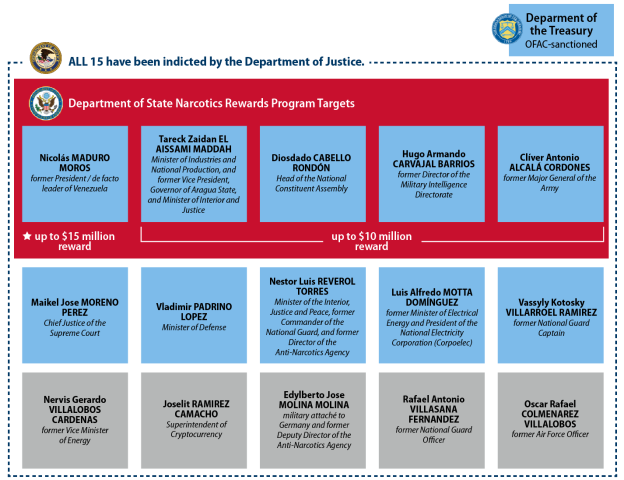U.S. Indictment of Top Venezuelan Officials
On March 26, 2020, Attorney General William Barr announced the indictment of Venezuela's leader, Nicolás Maduro (whom the United States does not recognize as Venezuela's legitimate president), and other current and former high-ranking Venezuelan officials. As charged, Maduro allegedly participated in the Cartel of the Suns drug trafficking organization in conspiracy with the Colombian terrorist organization, the Revolutionary Armed Forces of Colombia (FARC), to produce and traffic illicit drugs to the United States.
Maduro's indictment marks an escalation in U.S. efforts since January 2019 to compel him to leave office so that a transition government can convene free and fair elections. Although Congress largely has supported sanctions on the Maduro government, these indictments occur as some Members are asking the Administration to temporarily ease sanctions due to the Coronavirus Disease 2019 (COVID-19) pandemic.
Background
The Department of Justice's (DOJ's) indictments outline federal charges against 18 individuals: 15 current and former Venezuelan officials (see Figure 1), 2 Colombian FARC leaders, and a Venezuelan businessman. The charges (links to charges follow), reach across Venezuela's highest government offices, including the presidency and vice presidency; supreme court; national constituent assembly; ministry of defense, including national guard, armed forces, and military intelligence; ministry of energy; cryptocurrency supervisory body; and national drug control agency. The nature of the crimes alleged include violations of U.S. laws (links to relevant U.S. code provisions follow) related to narco-terrorism, drug trafficking, money laundering, sanctions evasion, and conspiracy to defraud the U.S. government.
Beyond their indictments, 12 of the 18 individuals are also subject to U.S. sanctions (related to the situation in Venezuela, narcotics trafficking, or both). The State Department is offering a total of up to $55 million for information leading to the arrest, conviction, or both of five of these individuals. Maduro dismissed the charges as "dirty, false accusations," and Russia, his primary foreign backer, called them "absurd." However, one of those charged—Cliver Alcalá—surrendered to U.S. authorities. Another, Hugo Carvajal, is reportedly negotiating his surrender.
'
The indictments against senior Venezuelan officials continue DOJ's decade-long effort to uncover corruption involving Maduro and his associates. Since 2010, DOJ has charged several dozen current or former officials. Some have pled guilty, been convicted, or both, including a former national treasurer, senior state economic development bank official, military officer, judge, and officials from state oil company, Petróleos de Venezuela (PdVSA), and its subsidiaries.
Maduro joins a list of current and former heads of state who have been indicted in the United States, including Manuel Noriega (de facto leader of Panama; captured in 1990 after a U.S. invasion and sentenced in 1992), Alfonso Portillo (former president of Guatemala; sentenced in 2014), and Rafael Callejas (former president of Honduras; pled guilty in 2016).
Policy Context
The U.S. government ceased to recognize Nicolás Maduro as Venezuela's legitimate president in January 2019. The Administration has since implemented a "maximum pressure" campaign combining diplomatic and economic elements to compel Maduro to leave office. Congress and U.S allies have opposed using U.S. military force in Venezuela. The Administration has encouraged countries to recognize Interim President Juan Guaidó, condemned the Maduro government's repressive actions, and coordinated the imposition of targeted sanctions with allies. U.S. sanctions target Maduro's government, Venezuela's oil and gold sectors, and the central bank. The Treasury Department recently imposed secondary sanctions on subsidiaries of Russia's Rosneft oil company for helping PdVSA evade sanctions. The State Department's $15 million reward offer for information leading to Maduro's arrest curtails his ability to travel. On March 31, the Administration proposed a "democratic transition framework" backed by Guaidó offering sanctions relief if Maduro allows a transition government to form. The following day, President Trump deployed additional naval counterdrug assets to the Caribbean.
Some speculate that the combination of low oil prices, a pandemic that could quickly overwhelm Venezuela's hollowed out health services, and the indictments could topple the Maduro government. Others contend that the indictments, issued as the government is trying to contend with the COVID-19 pandemic, could bolster regime cohesion. Some also point to China's medical aid and continued Russian involvement in the oil sector, despite Rosneft's departure, as evidence that Maduro may stay in power.
Considerations for U.S. Policymakers
As Members of Congress monitor the situation in Venezuela, issues they may consider include
- Reprisals and Unrest. After the U.S. indictment announcement, Venezuela's prosecutor general summoned Juan Guaidó to appear for his reported role in plotting a coup. With retaliation against Guaidó or political unrest possible, COVID-19 could severely limit U.S. policy responses.
- Sanctions Relief? U.N. officials and some experts have urged the United States to ease financial and sectoral sanctions on Venezuela, even if Maduro remains in office, so that the country can be in a better financial position to address COVID-19. U.S. indictments, continued sanctions, and antidrug asset deployments could complicate an already tense environment for humanitarian agencies working with Venezuelan entities.
- Humanitarian Accord. Venezuela has been dealing with a humanitarian crisis due to a lack of food, medicine, and social services; health infrastructure has essentially collapsed. Some observers support a Guaidó-Maduro humanitarian accord that would facilitate delivery of medical supplies. International Crisis Group has criticized the U.S. indictments for hindering negotiations for an accord. Others assert that the indictments have increased pressure on Maduro to accept a transition government that would receive sanctions relief and more U.S. assistance.
- Economic Relief. In March 2020, Maduro asked the International Monetary Fund (IMF) for $5 billion in economic relief. European Union leaders backed the request; U.S. officials opposed it. The IMF rejected Maduro's request.
- State Sponsor of Terrorism (SSOT) Designation. Some observers assert that DOJ's indictments provide evidence to support an SSOT designation for Venezuela, which would trigger new sanctions. Others caution that the indictments may not prove the Venezuelan government has "repeatedly provided support for acts of international terrorism," as required by law.
